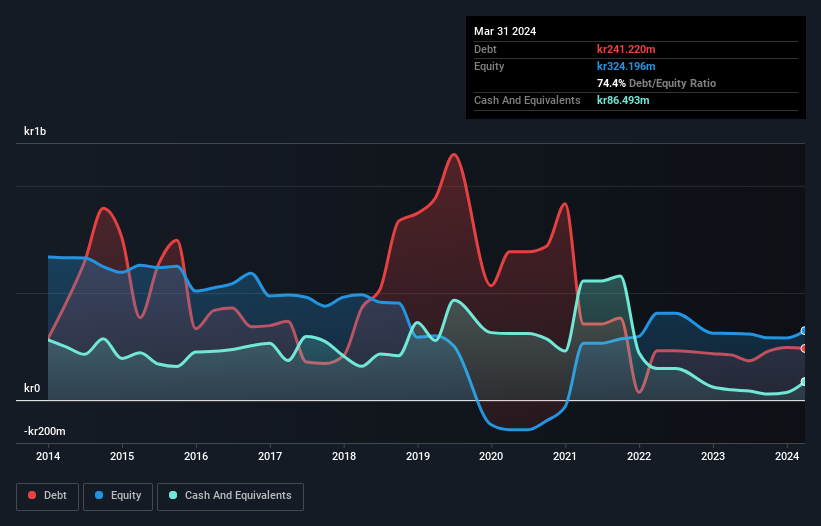Legendary fund manager Li Lu (who Charlie Munger backed) once said, 'The biggest investment risk is not the volatility of prices, but whether you will suffer a permanent loss of capital.' When we think about how risky a company is, we always like to look at its use of debt, since debt overload can lead to ruin. Importantly, Eqva ASA (OB:EQVA) does carry debt. But the real question is whether this debt is making the company risky.
When Is Debt Dangerous?
Debt assists a business until the business has trouble paying it off, either with new capital or with free cash flow. Part and parcel of capitalism is the process of 'creative destruction' where failed businesses are mercilessly liquidated by their bankers. However, a more frequent (but still costly) occurrence is where a company must issue shares at bargain-basement prices, permanently diluting shareholders, just to shore up its balance sheet. Of course, plenty of companies use debt to fund growth, without any negative consequences. When we think about a company's use of debt, we first look at cash and debt together.
View our latest analysis for Eqva
What Is Eqva's Debt?
As you can see below, at the end of March 2024, Eqva had kr241.2m of debt, up from kr211.3m a year ago. Click the image for more detail. However, it does have kr86.5m in cash offsetting this, leading to net debt of about kr154.7m.

How Strong Is Eqva's Balance Sheet?
The latest balance sheet data shows that Eqva had liabilities of kr335.0m due within a year, and liabilities of kr132.5m falling due after that. Offsetting this, it had kr86.5m in cash and kr297.4m in receivables that were due within 12 months. So its liabilities total kr83.6m more than the combination of its cash and short-term receivables.
While this might seem like a lot, it is not so bad since Eqva has a market capitalization of kr325.8m, and so it could probably strengthen its balance sheet by raising capital if it needed to. But we definitely want to keep our eyes open to indications that its debt is bringing too much risk.
We use two main ratios to inform us about debt levels relative to earnings. The first is net debt divided by earnings before interest, tax, depreciation, and amortization (EBITDA), while the second is how many times its earnings before interest and tax (EBIT) covers its interest expense (or its interest cover, for short). This way, we consider both the absolute quantum of the debt, as well as the interest rates paid on it.
Even though Eqva's debt is only 2.2, its interest cover is really very low at 2.2. This does suggest the company is paying fairly high interest rates. In any case, it's safe to say the company has meaningful debt. We also note that Eqva improved its EBIT from a last year's loss to a positive kr55m. There's no doubt that we learn most about debt from the balance sheet. But it is Eqva's earnings that will influence how the balance sheet holds up in the future. So when considering debt, it's definitely worth looking at the earnings trend. Click here for an interactive snapshot.
Finally, while the tax-man may adore accounting profits, lenders only accept cold hard cash. So it's worth checking how much of the earnings before interest and tax (EBIT) is backed by free cash flow. Over the last year, Eqva saw substantial negative free cash flow, in total. While investors are no doubt expecting a reversal of that situation in due course, it clearly does mean its use of debt is more risky.
Our View
Mulling over Eqva's attempt at converting EBIT to free cash flow, we're certainly not enthusiastic. But at least its level of total liabilities is not so bad. Once we consider all the factors above, together, it seems to us that Eqva's debt is making it a bit risky. Some people like that sort of risk, but we're mindful of the potential pitfalls, so we'd probably prefer it carry less debt. When analysing debt levels, the balance sheet is the obvious place to start. But ultimately, every company can contain risks that exist outside of the balance sheet. We've identified 3 warning signs with Eqva (at least 1 which is a bit concerning) , and understanding them should be part of your investment process.
When all is said and done, sometimes its easier to focus on companies that don't even need debt. Readers can access a list of growth stocks with zero net debt 100% free, right now.
Valuation is complex, but we're here to simplify it.
Discover if Eqva might be undervalued or overvalued with our detailed analysis, featuring fair value estimates, potential risks, dividends, insider trades, and its financial condition.
Access Free AnalysisHave feedback on this article? Concerned about the content? Get in touch with us directly. Alternatively, email editorial-team (at) simplywallst.com.
This article by Simply Wall St is general in nature. We provide commentary based on historical data and analyst forecasts only using an unbiased methodology and our articles are not intended to be financial advice. It does not constitute a recommendation to buy or sell any stock, and does not take account of your objectives, or your financial situation. We aim to bring you long-term focused analysis driven by fundamental data. Note that our analysis may not factor in the latest price-sensitive company announcements or qualitative material. Simply Wall St has no position in any stocks mentioned.
Have feedback on this article? Concerned about the content? Get in touch with us directly. Alternatively, email editorial-team@simplywallst.com
About OB:EQVA
Eqva
Provides technical solutions and services to maritime and land based industries in Norway and internationally.
Excellent balance sheet and good value.
Market Insights
Community Narratives




